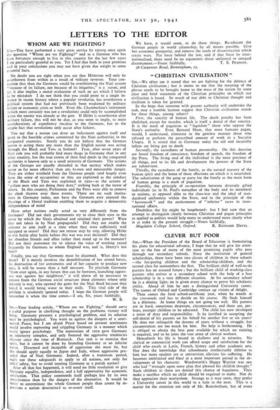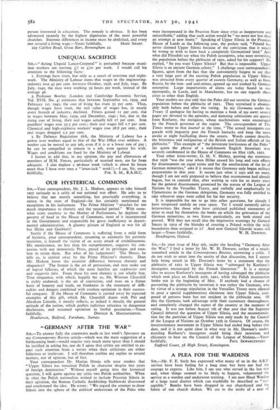CLEVER BUT POOR
Sin,—When the President of the Board of Education is formulating his plans for educational advance, I hope that he will give his atten- tion to the fate of many of the most promising pupils who pass through our secondary schools. Since the institution of general scholarships, there have been two classes of children in these schools —the fee-paying children and the scholarship-children, and the second class far outnumbers the first. The brilliant child of well-to-do parents has an assured future ; but the brilliant child of working-class parents who arrives at a secondary school with the help of a free scholarship is in a very different situation. At his secondary school he is a shining light; he is given every chance to prove his scholastic ability. Ahead of him he sees a distinguished University career. The names of Oxford and Cambridge conjure up visions of delight.
Then comes the fatal school-certificate year, when he stands at the crossroads and has to decide on his course. He finds himself in a dilemma. At home things are not going too well. His parents are in hard, sometimes desperate, circumstances, and there are, per- haps, younger children to be educated. The child has now developed a sense of duty and responsibility. Is he justified in accepting the self-denial of his parents on his behalf for another five or six years? He does not relinquish the dreams of years without a struggle, but circumstances are too much for him. No help is forthcoming. He . is obliged to obtain the best post available for which no training is required, and so he joins the vast army of clerical workers.
Henceforth his life is bound in shallows and in miseries. No clerical or commercial work can afford scope and satisfaction for the child who excels at Latin, French, history and other academic arts. Nor does the knowledge that schoolmates intellectually inferior to him but more opulent are at universities alleviate his suffering. He becomes embittered and blasé at a most important period in the de- velopment of his character. Wordsworth's Happy Warrior was one who had " wrought upon some plan that pleased his childish thought." Such children as these are denied this chance of happiness. They make a sacrifice which no child should be required to make. Nor do they appreciate their martyrdom. Strange as it may seem, they prefer a University career in this world to a halo in the next. This is a matter for the attention not only of Mr. Ramsbotham, but of every
person interested in education. The remedy is obvious. It has been advocated recently by the highest dignitaries of the most powerful churches. Extreme differences in income must be abolished, and every
one assured a living wage.—Yours faithfully, MARY SHARP. 225 Calshot Road, Great Barr, Birmingham 22.































 Previous page
Previous page